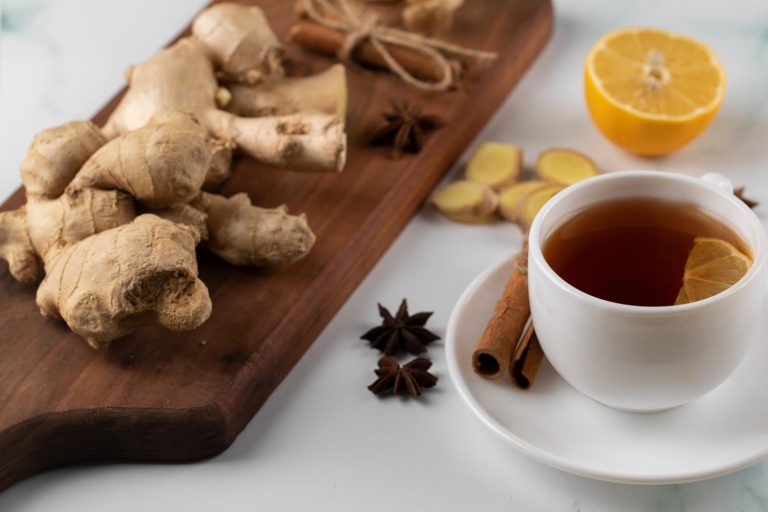Have you ever noticed how certain drinks can transform your day? One sip of a soothing tea can melt away stress, while a bold coffee might kickstart your energy. But what if I told you that there are specific teas designed to help your stomach feel happier? That’s right! Detox teas can be a gentle and effective way to support digestive health. Whether you’re bloated, feeling sluggish, or just looking to refresh your gut, I’ve gathered five detox tea recipes that can help you on your journey to a happier stomach.
Contents
Why Detox Tea?
Before diving into the recipes, let’s chat about why detox tea can be beneficial for your stomach. Detox teas typically combine herbs and ingredients known for their digestive properties. Many of these ingredients, like ginger and peppermint, have been used for centuries in traditional medicine. They can help soothe the stomach, reduce bloating, and promote better digestion.
But let’s be real: detoxing isn’t a one-size-fits-all solution. It’s important to listen to your body and understand what works for you. And while some may swear by detox teas, others might find them less effective. Always consult a healthcare provider if you have specific concerns.
1. Ginger-Lemon Detox Tea
Ginger and lemon are a classic duo, and for good reason. Ginger is known for its anti-inflammatory properties and can help alleviate nausea, while lemon provides a refreshing zing and is rich in vitamin C.
Ingredients:
- 1 inch fresh ginger root, sliced
- Juice of half a lemon
- 2 cups water
- Honey (optional)
Instructions:
- Boil the water in a small pot.
- Add the sliced ginger and let it simmer for about 10 minutes.
- Remove from heat, strain into a cup, and add the lemon juice.
- Sweeten with honey if desired.
Pros:
- Ginger is great for digestion and can reduce bloating.
- Lemon adds a refreshing flavor and boosts hydration.
Cons:
- Some people may find ginger too spicy, so adjust according to your taste.
2. Peppermint Tea
Peppermint is another powerhouse herb when it comes to digestive health. It can help relax the muscles of the gastrointestinal tract, making it easier for gas to pass and relieving discomfort.
Ingredients:
- 1 tablespoon dried peppermint leaves (or 1 tea bag)
- 2 cups water
Instructions:
- Boil the water and add the peppermint leaves.
- Let steep for 5-10 minutes.
- Strain and enjoy!
Pros:
- Helps relieve bloating and gas.
- Naturally caffeine-free, making it perfect for any time of day.
Cons:
- Peppermint can sometimes exacerbate acid reflux in sensitive individuals.
3. Turmeric Detox Tea
Turmeric is often hailed as a superfood. Its active compound, curcumin, has powerful anti-inflammatory and antioxidant properties. This tea can help soothe the digestive tract and promote overall gut health.
Ingredients:
- 1 teaspoon ground turmeric (or 1-inch fresh turmeric root, grated)
- 1 cup water
- A pinch of black pepper (to enhance absorption)
- Honey or lemon (optional)
Instructions:
- Boil the water and add the turmeric and black pepper.
- Simmer for 10 minutes.
- Strain, and add honey or lemon if desired.
Pros:
- Supports anti-inflammatory processes and gut health.
- Can be made with easily accessible ingredients.
Cons:
- The taste might be strong for some; adjust the amount of turmeric according to your preference.
4. Fennel Seed Tea
Fennel seeds are often overlooked but are a fantastic digestive aid. They have been used in traditional medicine to reduce bloating and gas and can add a sweet, licorice-like flavor to your tea.
Ingredients:
- 1 teaspoon fennel seeds
- 2 cups water
Instructions:
- Crush the fennel seeds slightly to release their oils.
- Boil the water and add the crushed seeds.
- Let it steep for 10 minutes, strain, and enjoy.
Pros:
- Fennel is gentle on the stomach and can help relieve digestive discomfort.
- It has a pleasant flavor that many find enjoyable.
Cons:
- Some people may not like the licorice taste.
5. Chamomile Tea
Chamomile tea is well-known for its calming properties, but it also has benefits for digestion. It can help relax the muscles of the intestines and is often used to soothe upset stomachs.
Ingredients:
- 1 chamomile tea bag (or 2 tablespoons dried chamomile flowers)
- 2 cups water
Instructions:
- Boil the water and add the chamomile.
- Let it steep for 5-10 minutes.
- Strain if using loose flowers and enjoy!
Pros:
- Helps with relaxation and can reduce stomach cramps.
- Naturally caffeine-free, making it a great bedtime drink.
Cons:
- Some people might be allergic to chamomile, especially if they’re allergic to ragweed.
FAQs
1. How often can I drink detox tea?
You can enjoy detox tea daily, but listen to your body. If you experience any discomfort, consider reducing your intake.
2. Are there any side effects?
While most herbal teas are safe, some individuals may experience digestive upset or allergic reactions. Always start with small amounts and see how your body reacts.
3. Can I add other ingredients to these teas?
Absolutely! Feel free to customize your teas with ingredients like honey, lemon, or even a sprinkle of cinnamon for added flavor.
4. Are detox teas a replacement for meals?
No, detox teas should complement a balanced diet, not replace meals. They can be a great addition to your routine for digestive support but don’t rely on them solely for nutrition.
Conclusion
Detox teas can be a delightful and soothing way to support your digestive health. From the spicy warmth of ginger to the calming notes of chamomile, there’s a detox tea for every palate. Remember, though, that these teas are just one piece of the puzzle. A balanced diet, regular exercise, and staying hydrated are essential for overall digestive wellness.
So, the next time you’re feeling a little off, consider brewing a cup of one of these detox teas. Your stomach might just thank you! And as always, listen to your body and consult a healthcare provider for personalized advice.
This article is for educational purposes only and is not a substitute for professional medical advice. Always consult a qualified healthcare provider before making changes to your health routine.
References
-
Khanna, S., & Ranjan, R. (2021). The Role of Ginger in Gastrointestinal Disorders: A Review. Journal of Ethnopharmacology, 276, 114-122. https://doi.org/10.1016/j.jep.2021.114122
-
Kwon, H. S., & Lee, J. H. (2019). Peppermint Oil for Irritable Bowel Syndrome: A Systematic Review and Meta-Analysis. Clinical Gastroenterology and Hepatology, 17(11), 2274-2283. https://doi.org/10.1016/j.cgh.2019.02.012
-
Gupta, S. C., & Aggarwal, B. B. (2019). Turmeric, the Golden Spice: A Review of Its Biological Effects. Journal of Nutritional Biochemistry, 73, 108-114. https://doi.org/10.1016/j.jnutbio.2019.03.006
Get Your FREE Natural Health Guide!
Subscribe now and receive our exclusive ebook packed with natural health tips, practical wellness advice, and easy lifestyle changes, delivered straight to your inbox.





